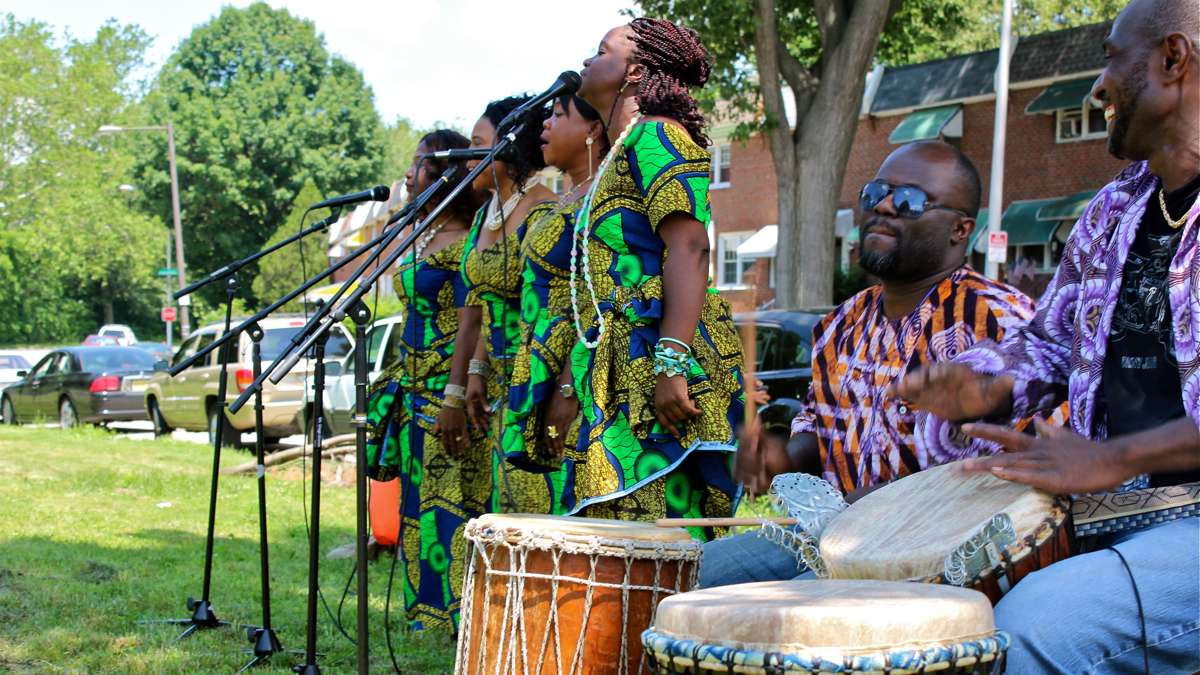Liberian Women’s Chorus for Change using music to heal in Southwest Philly
ListenAbout 15,000 Liberian immigrants live in Philadelphia. Their presence became painfully visible when a fire ripped through several rowhouses in Southwest Philadelphia, leaving four children dead and dozens of families homeless and grieving.
Everyday life for this community is as hard as that of other African immigrants, but aggravated by the legacy of 14 years of armed conflicts in Liberia. One group of Liberian singers is using traditional and new songs, as well as dramatic skits, to help their fellow immigrants navigate life here.
For Fatu Gayflor, not a day goes by when she doesn’t think of the son she lost in the Liberian civil war The celebrated singer was in the Ivory Coast recording an album in 1989 and had left her infant son with family, when the second Liberian civil war started. She never saw him again.
He would have been 25 this month. One song always brings him to mind.
“The song says, ‘has he eaten today? Is he in the rain somewhere in the forest? Is he getting love?'” Gayflor said. “These are very troubling things. I don’t like to sing this song, but we do because we have to take a message to the people.”
This lament adapted from a traditional ceremonial tune is sung at every concert Fatu Gayflor and the three other singers of the Liberian Women’s Chorus for Change perform in Philadelphia. It speaks of the collective legacy of grief and violence many Liberians carry with them as immigrants and refugees.
Performing in different U.N. refugee camps in Africa, Gayflor says she rediscovered the healing power of music.
“At the time, I didn’t know the word therapy. But I knew that singing to the people make them feel better,” she said. “So when I wrote that song, everywhere I went to perform in any refugee camp people, would cry and always sit and talk. Because as you live, you cannot keep your problems to yourself.”
For years now, she has used her art to promote peace, unity and dialogue.
Once in Philadelphia, Gayflor met other Liberian performers interested in serving their community as they navigated the challenges of immigrant life. To shape their message, Gayflor, Tokay Tomah and Zaye Tete spent a year interviewing fellow Liberians to identify their most pressing needs. Under the guidance of the Philadelphia Folklore Project, they formed the Liberian Women’s Chorus for Change last year.
The Liberian women reported many common concerns, “including abuse — emotional, physical, economic — at the hands of their partners,” said Toni Shapiro-Phim of the Philadelphia Folklore Project. The women rarely spoke about it and did not know how to access help if they wanted to seek it out.
Shaprio-Phim says “economic stress, poverty and having the responsibility of supporting a family within systems that they don’t necessarily understand or haven’t yet mastered” add to the overall family tension. “And the outlet sometimes is violence, or it’s secretiveness,” she said.
The secrecy is mostly manifested in the ways the family’s income is used, especially when women also work. So the chorus has created dramatic educational skits about money management.
The Liberian Women’s Chorus for Change message has met with some criticism, particularly from African men who feel their work is subverting traditional gender roles.
“We are family oriented, we are not trying to separate men and women, children and their family,” insisted Gayflor. “We just want to tell the women that they don’t have to do the same things they did in Africa in relations to the men in their families. Here they can talk about their concerns.
“Because the reason we are going through these problems is that we are now living in a new country were we all work, and the stress is too much,” she said. “The stress that we never felt back home is causing us to fight, if you keep it in, it becomes trouble.”
The chorus and the Philadelphia Folklore Project have just been awarded a grant from the Pew Center for Arts and Heritage to continue their work in the African community. Gayflor is also the recipient of a Pew Arts Fellowship that will allow her to resume her work as an individual artist that was interrupted by war.
Fatu Gayflor and the Liberian Women’s Chorus for Change will be performing at a benefit concert for the Southwest Philadelphia fire victims this Saturday afternoon on Gesner Street, at the site of the fire.
WHYY is your source for fact-based, in-depth journalism and information. As a nonprofit organization, we rely on financial support from readers like you. Please give today.









